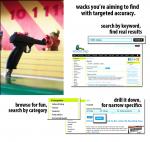What’s your story?
Share and find customer experiences
Connect with the people behind them
Wacktrap is
feedback made social
Trending Content
TSA Demands Airport Naked Scanners Have Ability to Transfer Photo Images
by hearit
While TSA has repeatedly promised the public and airport travelers that full body scanner devices are automatically deleting the images after they're reviewed—stored photos prove otherwise.
TSA demands from scanner manufacturers that all airport body scanners purchased must be able to store and transmit scanned images for "testing, training, and evaluation purposes" by the agency--meanwhile, lawsuits over rights are now filed.
Less than three months ago, it was revealed that US Marshals at a federal courthouse, operating the Gen 2 millimeter wave scanner, were storing the images—bringing attention to the fact that it’s not that TSA doesn’t have the ability to store scans, the agency’s just claiming it doesn’t happen. The full body AIT scanners, like those used in airports, are shipped out with the ability to offload scanned images for "testing" purposes--but the option’s not supposed to be activated.
Apparently it’s not hard to figure out how to use the storing feature, and doesn’t seem to be an accidental ‘inclusion’ by the full body scanner manufacturers. Shipping the “naked” scanners with capability for image storage—to clients like airports and TSA—lays the groundwork for future breaches of privacy. The new “naked scanners” use advanced imaging technology (AIT), capable of producing highly detailed pictures of the human body—in its most naked form.
Men, in particular, seem to be taking serious offense with the new form of scans—many opting for the ‘optional’, enhanced pat-down instead of the detailed scans. Maybe it’s the media references to the scanner that “shoots a picture of your junk”. The number of naked scanners at U.S. airports currently ranges under 400 but is expected to jump to 450 by year’s end, as nationwide deployment continues throughout additional U.S. airports.
The TSA agency has tried to downplay consumer privacy issues, claiming that the AIT “naked scanning” units won't save images—but the statement’s a bit misleading, because the insinuation by TSA is that the scanners can’t save images. The AIT unit scanners do have the capability to save scans—proved by the fact that the U.S. Marshals Service in Florida stored over 35,000 AIT scans of people. An AIT unit that was tested in the Washington, D.C., federal courthouse was actually sent back to the scanner manufacturer--with images still stored on the scanner upon its return.
The potential breach of privacy is a bad one. Not only are some of the AIT scanners being used in a manner to save images—but then those saved images can be sent in a round-robin, back to a third-party, for those images to be viewed by someone unknown.
The TSA agency still claims that no images of airport travelers will be saved, transmitted, or printed--but that’s all a bit interesting, since TSA has actually requested exactly the opposite in its scanner orders made to equipment manufacturers: TSA agency procurement specifications actually request that all AIT scanner units, being ordered, specifically possess the ability to export scanned images and additionally transfer those images across high speed data networks.
TSA tells scanner manufacturers that all airport body scanners the agency purchases must be able to store and transmit scanned images for "testing, training, and evaluation purposes." TSA swears, however, that those storage and transmission capabilities are not "normally" activated when the devices are installed at airports.
No word on what defines an "abnormal" circumstance where the TSA would activate such capabilities. The Electronic Privacy Information Center--a Washington, D.C.-based advocacy group-- has already filed a lawsuit and requested that a federal judge grant an immediate injunction, requiring a cease of TSA's full body scanning program.
In a separate lawsuit, EPIC obtained a letter (PDF) from the Marshals Service, part of the Justice Department, and released the document publicly. The ability to transfer images across high speed data networks sounds like an awfully odd request, when those TSA images—supposedly—aren’t going anywhere.
Location
SPEED UP YOUR ONLINE GROWTH
How To Wack
Take the Tour
Click on any image to start











